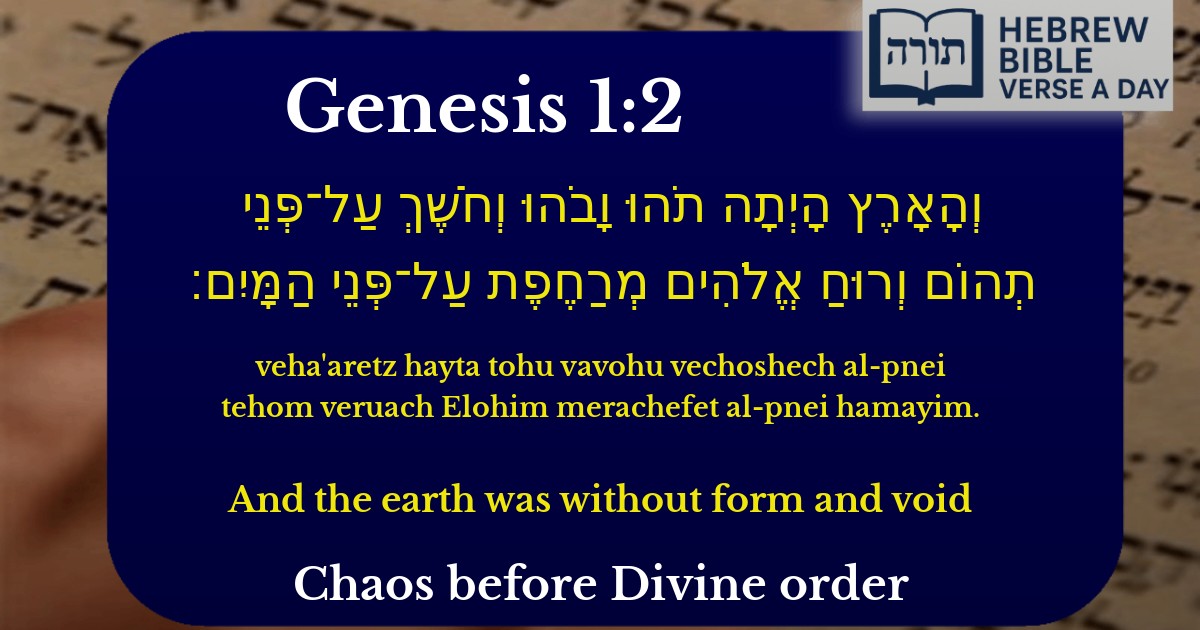Join Our Newsletter To Be Informed When New Videos Are Posted
Join the thousands of fellow Studends who rely on our videos to learn how to read the bible in Hebrew for free!
Hebrew Text
וְהָאָרֶץ הָיְתָה תֹהוּ וָבֹהוּ וְחֹשֶׁךְ עַל־פְּנֵי תְהוֹם וְרוּחַ אֱלֹהִים מְרַחֶפֶת עַל־פְּנֵי הַמָּיִם׃
English Translation
And the earth was without form and void
Transliteration
Veha'aretz hayta tohu vavohu vechoshech al-pnei tehom veruach Elohim merachefet al-pnei hamayim.
Hebrew Leining Text
וְהָאָ֗רֶץ הָיְתָ֥ה תֹ֙הוּ֙ וָבֹ֔הוּ וְחֹ֖שֶׁךְ עַל־פְּנֵ֣י תְה֑וֹם וְר֣וּחַ אֱלֹהִ֔ים מְרַחֶ֖פֶת עַל־פְּנֵ֥י הַמָּֽיִם׃
וְהָאָ֗רֶץ הָיְתָ֥ה תֹ֙הוּ֙ וָבֹ֔הוּ וְחֹ֖שֶׁךְ עַל־פְּנֵ֣י תְה֑וֹם וְר֣וּחַ אֱלֹהִ֔ים מְרַחֶ֖פֶת עַל־פְּנֵ֥י הַמָּֽיִם׃
🎵 Listen to leining
Parasha Commentary
📚 Talmud Citations
This verse is quoted in the Talmud.
📖 Chagigah 12a
The verse is discussed in the context of the creation narrative, particularly focusing on the state of the earth before the creation of light and the role of the 'spirit of God' hovering over the waters.
📖 Genesis Rabbah 2:4
The Midrash explores the meaning of 'tohu va'vohu' (without form and void) and the nature of the darkness over the deep, connecting it to the primordial elements of creation.


Understanding "Tohu vaVohu" (תֹהוּ וָבֹהוּ)
Rashi explains that תֹהוּ (tohu) refers to astonishment and desolation, while בֹהוּ (vohu) refers to emptiness. The earth was in a state of chaos before Hashem brought order to creation. This aligns with the Midrash (Bereishit Rabbah 2:2), which describes "tohu" as a green line surrounding the world and "vohu" as the slimy stones submerged in water—symbolizing primordial disorder before divine intervention.
The Darkness Over the Deep (וְחֹשֶׁךְ עַל־פְּנֵי תְהוֹם)
The Ramban (Nachmanides) comments that the darkness mentioned here was not merely the absence of light but a tangible, substantive darkness that covered the primordial waters (תְהוֹם, tehom). The Talmud (Chagigah 12a) elaborates that this darkness was one of the seven things created before the world itself, emphasizing its fundamental role in the order of creation.
The Divine Spirit Hovering (וְרוּחַ אֱלֹהִים מְרַחֶפֶת)
Rashi interprets רוּחַ אֱלֹהִים (ruach Elokim) as the "spirit of Hashem," akin to a bird hovering over its nest, ready to bring forth creation. The Midrash (Bereishit Rabbah 2:4) compares this to a dove hovering over its young, symbolizing divine mercy and the preparatory stage before the act of creation. The Rambam (Moreh Nevuchim 1:2) suggests this "hovering" represents the divine will in motion, setting the stage for the formation of the universe.
Key Themes in Orthodox Interpretation